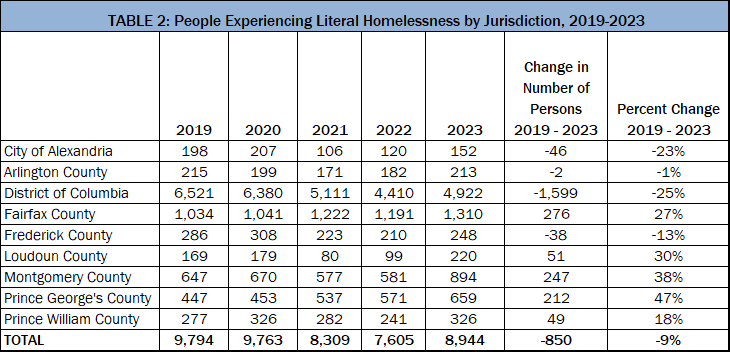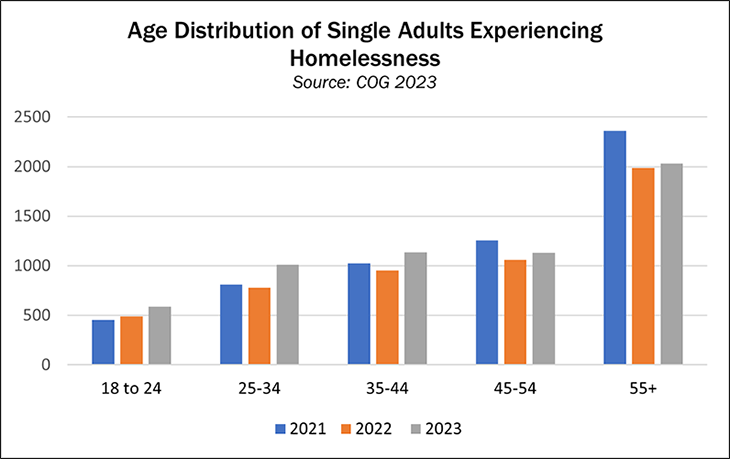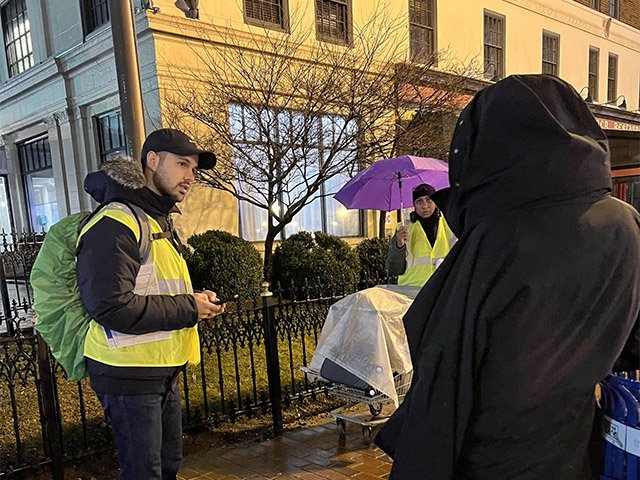A total of 8,944 people are experiencing homelessness in the region in 2023, according to a new report by the Metropolitan Washington Council of Governments (COG) that highlights results from the annual Point-in-Time (PIT) count conducted by area jurisdictions and homeless services providers on January 25, 2023.
This year’s number is 1,339 more people experiencing homelessness in the region than in 2022—when the region had its lowest number on record for the count—an 18 percent increase. All nine jurisdictions that participated in the count observed a year-over-year increase.
However, the COG report, Homelessness in Metropolitan Washington, also noted that over the last five years, regional homelessness has decreased nine percent. During this period, the District of Columbia, the City of Alexandria, and Frederick County have observed the largest decreases in the total number of people experiencing homelessness, seeing a 25 percent, 23 percent, and 13 percent reduction since 2019, respectively.

The count found that 29,017 residents who had previously experienced homelessness are now permanently housed – an all-time high for the region. Chronic homelessness, defined by HUD as someone with a disabling condition who has either been continuously homeless for a year or more or has had at least four episodes of homelessness in the past three years cumulatively equaling at least 12 months, also decreased year-over-year for several participating jurisdictions. Over a 5-year period, the region’s number of persons experiencing chronic homelessness dropped 4 percent, showing progress in the prevention of some of the most challenging cases of homelessness.
“Through our investments in housing services and programs, we ensure more residents can access safe and stable housing in our region,” explained Elisabeth Young, COG Homeless Services Planning and Coordinating Committee Chair and the Community Partnership for the Prevention of Homelessness Deputy Chief of Policy and Programs, sharing that, “as housing programs prompted by the COVID-19 pandemic have ended, including eviction moratoriums and some emergency housing assistance, the region is saddened to see more residents experiencing homelessness. We have much more work to do.”
This year’s COG report also draws greater attention to the issue of older adults experiencing homelessness, which presents additional challenges in ensuring services exist to meet specialized needs for an aging population, including health and mobility limitations.
“As the Baby Boomer generation reaches retirement age, there is concern that more individuals over the age of 65 will experience homelessness in the region in the coming years,” said COG Housing Program Manager Hilary Chapman. “Our member governments are working together, sharing strategies to anticipate this emerging need.”
The 2023 PIT count found that 35 percent (2,032 individuals) of adults without children experiencing homelessness were over the age of 55. 383 of these individuals were unsheltered, an increase from 118 unsheltered seniors in the 2022 PIT count for the region.

The PIT count provides a one-day “snapshot” of individuals in the region who are: unsheltered and living on the streets, including parks, alleys, and camp sites; staying in an emergency hypothermia shelter or safe haven; living in transitional housing where they receive supportive services designed to help them move into some form of permanent housing; and those no longer experiencing homelessness and are now living in permanent supportive housing or other permanent housing.
This is the 23rd consecutive year that COG has published its report to provide information on the scope and circumstances of homelessness in the region as well as the long-term impact of housing programs and services. Area jurisdictions connect regularly through COG to share strategies and coordinate their responses to homelessness.
MORE: Homelessness in Metropolitan Washington Report
